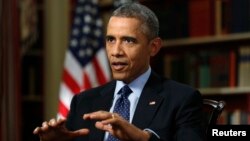U.S. President Barack Obama says Iran must freeze its sensitive nuclear activities for at least 10 years in order for an agreement to be successful. In an interview with the Reuters news agency, the U.S. leader also conceded that the chances of reaching such a deal are still less than 50 percent.
Obama spoke out on negotiations to contain Iran’s nuclear program, a day before Israeli Prime Minister Benjamin Netanyahu speaks on the issue before the U.S. Congress. The president told Reuters Monday that both leaders share a goal of ensuring that Iran does not obtain a nuclear weapon, but have a “substantial disagreement” on how to achieve that goal.
The American president said the best way to ensure that Iran does not develop a nuclear bomb is not through additional sanctions or a military option - but through diplomacy.
“What we've said from the start is by organizing a strong sanctions regime, what we can do is bring Iran to the table," he said. "And by bringing Iran to the table, force them to have a serious negotiation in which we are able to see exactly what's going on inside of Iran.”
The president added that a break-out period of a year - the time Iran would need to make a nuclear weapon, if it decided to do so - would give international monitors a chance to detect any violations, and that Iran could be stopped through military action during that period, if need be.
Obama said Iran should commit to freezing its nuclear program for at least 10 years in order for a successful deal to be reached, and he noted that the chances of reaching such an agreement were still less than 50 percent.
Israeli Prime Minister Benjamin Netanyahu is preparing to tell U.S. lawmakers that a potential nuclear deal with Iran would threaten the survival of Israel.
The prime minister’s decision to speak before Congress has drawn sharp criticism from many, including Democratic lawmakers who believe that the Israeli leader is going behind the back of the U.S. president and is undermining ongoing negotiations.
On Monday, Obama sought to downplay any perceived rift between the two leaders, noting that U.S. military support for Israel has been unprecedented during his administration.
But Obama said it was a mistake for Netanyahu to speak before Congress just weeks before the Israeli election. He said the move politicizes the relationship, and while not “permanently destructive,” is a distraction from the goal of stopping Iran from getting a nuclear weapon.
“When we first announced this interim deal, Prime Minister Netanyahu made all sorts of claims. This was going to be a terrible deal. This was going to result in Iran getting $50 billion worth of relief. Iran would not abide by the agreement. None of that has come true,” Obama said. “It has turned out that, in fact, during this period we've seen Iran not advance its program. In many ways, it's rolled back elements of its program.”
For his part, Netanyahu told the annual convention in Washington of the pro-Israel lobbying group AIPAC Monday that the U.S.-Israel relationship will weather the current disagreement and emerge even stronger.
“My speech is not intended to show any disrespect to President Obama or the esteemed office that he holds," Netanyahu said. "I have great respect for both. I deeply appreciate all that President Obama has done for Israel, security cooperation, intelligence sharing, support at the U.N. and much more.”
Analysts say the disagreement is not personal or partisan but policy-based - with both Obama and Netanyahu having fundamental differences on what is best for the national security of their respective countries - in this case - how best to keep Iran from obtaining a nuclear weapon.
Nemtsov Murder in Russia
During his interview with Reuters, Obama also addressed the murder of Russian opposition leader Boris Nemtsov. Nemtsov was gunned down near the Kremlin on Friday night in a gangland-style murder.
The president said Nemtsov's killing is a sign of a worsening climate in Russia where civil rights and media freedoms have been rolled back in the last several years.
“This is an indication of a climate at least inside of Russia in which civil society, independent journalists, people trying to communicate on the Internet, have felt increasingly threatened, constrained. And increasingly the only information that the Russian public is able to get is through state-controlled media outlets,” Obama said.
The U.S. president has called for a full investigation into the slaying of Nemtsov, a critic of President Vladimir Putin, and a former deputy prime minister.
“I have no idea at this point exactly what happened. What I do know is more broadly the fact that freedom of the press, freedom of assembly, freedom of information, basic civil rights and civil liberties inside of Russia are in much worse shape now than they were four or five, 10 years ago,” he said.
Obama met Nemtsov met during a trip in 2009 to Moscow, where the U.S. president held talks with opposition parties.
He said the killing is “part of what has allowed I think Russia to engage in the sort of aggression that it has against Ukraine,” he said.
In the interview Obama also weighed in on China, saying he is concerned about a proposed Chinese counterterrorism law that would require U.S. tech companies to turn over their data and encryption keys to the Chinese government.
Some information for this report from Reuters.














